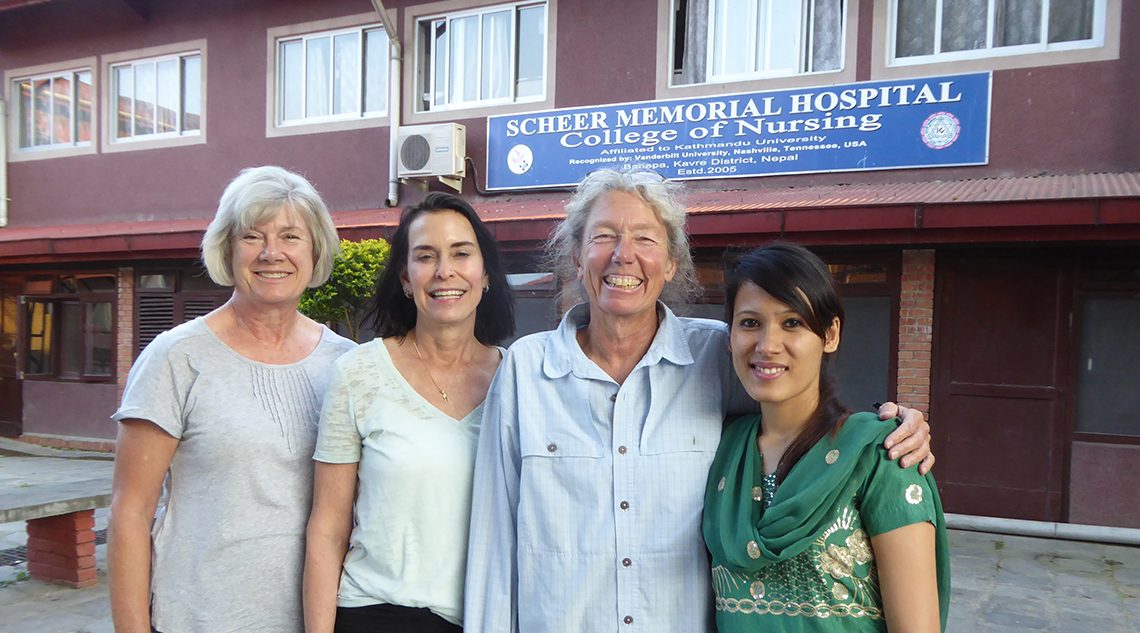In a remote Nepali village Jashada Gire, a Nepali woman, learned that a medical group was offering free surgery for women with severe cases of pelvic organ prolapse. When the team arrived at her village to provide education about women’s health issues and to examine patients suffering from prolapse, Jashada was delighted to learn that she was one of the candidates selected for surgery.
At the age of 50, Jashada made her first-ever trip into town to receive the surgery she had needed for more than 14 years. She was amazed to see the inside of a hospital for the first time and to meet foreign caregivers.
Since 2006, surgical teams from the Adventist hospitals in Denver have traveled twice each year to Scheer Memorial Hospital in the town of Benepa, near Kathmandu, Nepal, to provide volunteer services at their sister institution. Greg Hodgson, director of Global Health Initiatives for Centura Health, coordinates the trips. Jashada is just one of more than 400 women who have been blessed to receive free restorative surgery as a result of the GHI team’s efforts over the last 10 years.
Lynda Kithil is a retired surgical nurse who went on her fist mission trip to Nepal in 2007. That trip literally changed her life. She now volunteers full time with GHI as their surgical coordinator. She goes on at least three foreign mission trips each year, and can’t imagine what her life will be like when she reaches the point where she can’t travel anymore.
“It’s the little things that make these trips so special,” shares Lynda. “Meeting people in their homes; hearing their stories; showing a child their picture on the back of your camera; and seeing peoples lives dramatically improve by providing basic healthcare.”
Lynda adds, “Women who suffer from pelvic organ prolapse often deal with infection and unpleasant odors. Unfortunately, because of shame, they often end up sleeping with their animals. It’s really encouraging to be able to empower the women to return to their proper position in their family and with their husbands.”
The World Health Organization estimates that 800,000 women suffer from pelvic organ prolapse in Nepal, with 250,000 currently in need of surgery. Although prolapse generally results from giving birth to too many children, in Nepal the condition is greatly aggravated by strenuous physical labor and chronic malnutrition.
“While 400 surgeries may seem like a drop in the bucket compared to the 250,000 women who need surgery, each procedure is life changing for individual women like Jashada,” says Hodgson.
In collaboration with Denver and Kathmandu Rotary Clubs, with additional support from Sydney Adventist Hospital (Australia) and Women for Women, an organization from the Netherlands, the GHI team actively seeks to teach women how to avoid and treat gender-related health problems and works to improve neonatal mortality rates by teaching essential skills for raising healthy babies.
GHI recently helped to develop another new outreach project in Nepal. A mobile health clinic travels to remote villages to provide specialized care for residents affected by the earthquakes.
Learn how you can get involved
—
This article was submitted by Stephen King, senior vice president for Rocky Mountain Adventist Health/Centura Health, where he serves the five Adventist hospital campuses in Colorado. It was written by Mark Bond.










